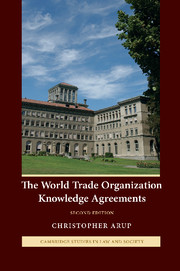Book contents
3 - The World Trade Organization
Published online by Cambridge University Press: 23 February 2010
Summary
This chapter provides an introduction to the norms and processes of the WTO and its two agreements. Such an introduction seeks to highlight aspects of the agreements which reveal most about their role in mediating inter-legalities around the world. But necessarily it commences with essential background on the institutional housing for the agreements, the WTO itself. We shall note that the WTO reveals both continuities and discontinuities with its predecessor, the GATT. Looking forward, there are general features of the WTO which are important to the impact, and possibly the modification, of the agreements. The chapter identifies the WTO's constitutional bodies for decision making over obligations, the nature of negotiations over amendments and additions to the agreements and especially the scope and force of the dispute settlement processes.
A particular interest lies with the role which law plays in structuring these processes. We should see that both order and indeterminacy are evident here. While the agreements impose disciplines, in many respects, they are best regarded as ‘unfinished stories’. They are providing further opportunities for mediation through successive rounds of agenda setting and bargaining over commitments, as well as the progressive output of the dispute settlement process in particular cases, and the opening out to influences from other international organisations and global civil society. Drawing on the thirteen years of implementation, a focus is the strategies the dispute settlement bodies have been adopting to manage the inter-legalities, as well as the experiments in the governing councils with different ways of negotiating space in the agreements.
- Type
- Chapter
- Information
- The World Trade Organization Knowledge Agreements , pp. 65 - 162Publisher: Cambridge University PressPrint publication year: 2008
- 1
- Cited by

